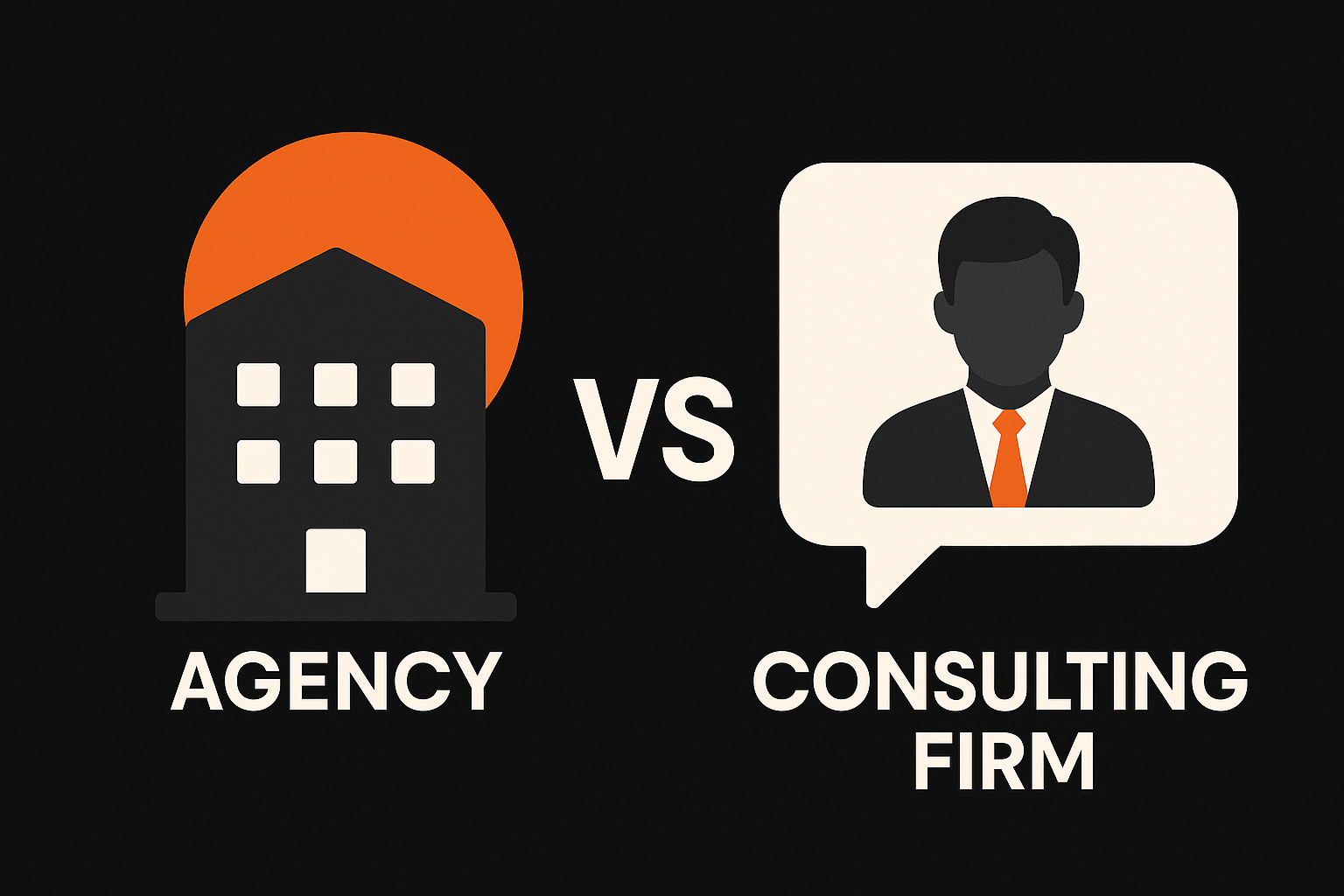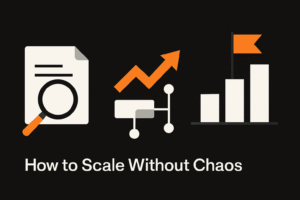Marketing Agency vs Consultant: Which Delivers Results?

You’re staring at a marketing problem that’s costing you revenue. Maybe your campaigns aren’t converting, your strategy feels scattered, or your small team is drowning in execution work. Now you’re weighing whether to hire a marketing agency or a marketing consulting firm—and the distinction matters more than you think. The core difference: marketing consultants develop the strategy and roadmap (the “what” and “why”), while marketing agencies execute campaigns and create deliverables (the “how” and “when”). Choose wrong, and you’ll either have brilliant recommendations gathering dust or expensive tactics disconnected from business goals. The right choice depends on your internal capabilities, budget, growth stage, and whether you need strategic direction, hands-on execution, or both.
Most businesses wrestle with this decision because agencies and consulting firms have evolved significantly. Traditional boundaries have blurred—some agencies now offer strategic consulting, while major consultancies have acquired creative shops. Meanwhile, AI is reshaping both models, with generative AI potentially affecting 47% of marketing activities according to Bain & Company, forcing both agencies and consultants to pivot from pure service delivery to solution-based approaches. The market has responded: 82% of companies now maintain hybrid models, working with both in-house teams and external partners. Understanding which external partner fits your specific situation could mean the difference between marketing that moves metrics and budget that evaporates into activity without outcomes.
What actually separates marketing agencies from consulting firms
The fundamental distinction lies in business models and deliverables. Marketing agencies operate on an execution-focused model, building multi-disciplinary teams of specialists—designers, copywriters, developers, media buyers—who work together to create and implement marketing campaigns. They charge for producing tangible assets: websites, ad campaigns, content calendars, social media management, and SEO implementation. An agency’s success metrics center on campaign performance, creative quality, and deliverable completion. When you hire an agency, you’re essentially saying “we know what we need to do; execute it for us.”
Marketing consulting firms operate on an advisory and strategic model, focused on solving business problems rather than creating deliverables. They work at the strategic level, collaborating with C-suite leadership to shape marketing strategy through frameworks, analysis, and recommendations. A consultant’s deliverables include strategic marketing plans, go-to-market strategies, competitive analyses, brand positioning frameworks, and organizational design—blueprints that someone else will execute. As one industry expert articulated: “A consultancy will develop a plan to help your company grow, while an agency expects you to already have that figured out.”
This execution-versus-advisory split manifests in every aspect of how these partners work. Agencies typically employ larger teams with hierarchical structures—from account managers and creative directors down to junior designers and copywriters—providing the production capacity needed for continuous output across multiple channels. A mid-sized agency might field 15-50 employees. Consulting firms maintain leaner, flatter structures with higher ratios of senior-to-junior staff, often just 5-20 consultants or even solo practitioners who bring deep strategic expertise without the overhead of production teams.
The engagement models differ substantially as well. Agencies commonly work on monthly retainers averaging $3,500-$10,000, providing ongoing campaign management and optimization with weekly status calls and account managers as primary contacts. Consulting firms more often use project-based fees of $10,000-$50,000+ for defined strategic initiatives like developing a comprehensive marketing strategy or conducting a market analysis, with direct access to senior consultants rather than account coordinators. According to recent industry data, 60% of agencies rely primarily on retainer models, while 30% of consultants prefer project-based pricing and 29% charge hourly rates between $150-$500 depending on expertise level.
The pricing reality: what you actually pay and what you get
Understanding the true cost structure helps cut through confusing proposals. Marketing agency retainer pricing breaks down into predictable tiers: 38% of agencies charge $1,001-$2,500 monthly (typically serving small businesses with limited scope), 22% charge $2,501-$5,000 monthly (mid-sized businesses with multi-channel needs), and under 10% command $10,001-$15,000+ monthly (comprehensive full-service partnerships). Service-specific costs reveal even more: SEO services average $7,000 monthly, social media marketing runs $2,500-$13,000 monthly, and content marketing ranges from $2,000-$30,000 monthly depending on volume and complexity. These retainers typically include team access, tools and software, ongoing optimization, and monthly reporting—essentially a turnkey execution engine.
Marketing consultant pricing follows different economics. Hourly rates span $75-$500 based on experience and specialization: entry-level generalists charge $50-$100 hourly, mid-level specialists command $100-$200, senior experts bill $200-$300, and elite specialists or fractional CMOs reach $300-$500+ per hour. The industry average hovers around $150-$175 hourly. For project work, expect $5,000-$20,000 for medium-scope projects like market analysis or channel strategy, and $20,000-$50,000+ for comprehensive initiatives like developing a full go-to-market strategy or marketing transformation roadmap. Monthly consulting retainers typically range from $5,000-$20,000 for mid-sized companies, with fractional CMO services costing $25,000-$42,000 monthly (still cheaper than the $150,000-$300,000+ annual cost of a full-time marketing executive).
The ROI calculus matters more than absolute costs. Top agencies report client ROI averaging 4.5:1—meaning $4.50 returned for every dollar spent—with professional services and marketing agencies typically achieving 3:1 to 5:1 ratios. Email marketing through agencies can generate $36-$40 per dollar spent, while SEO and content marketing frequently exceed 700% ROI over time. However, consultant ROI proves harder to measure since they don’t execute—a consultant’s $30,000 strategy project might enable $500,000 in new revenue, but only if your team implements it effectively. The hidden costs also differ: agencies include tools, software subscriptions, and specialists in their retainers, while hiring a consultant often means you’ll need additional contractors or internal resources for implementation, potentially adding 30-50% to your total investment.
Consider a real-world cost comparison. A marketing manager earning $75,000 annually actually costs your company around $97,500 with benefits (30% overhead). They provide 2,080 hours yearly at roughly $47/hour—but they’re generalists who may lack specialized expertise in paid media, technical SEO, or video production. A $5,000 monthly agency retainer ($60,000 annually) delivers access to specialists across all these disciplines with established processes, tools, and proven methodologies. Meanwhile, a consultant at $150/hour working 20 hours monthly costs just $3,000 for strategic guidance that a generalist manager might not provide—but leaves your team responsible for all execution work.
Making the right choice for your specific business situation
Your company’s growth stage fundamentally shapes which partner makes sense. Early-stage startups still validating product-market fit benefit most from consultants who can help think through target audiences, positioning strategy, and which marketing approaches warrant testing before significant budget commitments. One positioning consultant working with a pre-Series A SaaS company for $15,000 might save you from wasting $100,000 on campaigns targeting the wrong buyer personas. Once you’ve achieved product-market fit and secured Series A or B funding, agencies become more valuable for scaling execution quickly—you need campaigns running across multiple channels immediately, and agencies can mobilize existing teams faster than you can hire and train internal staff.
The internal capabilities assessment proves equally critical. If your team can execute but lacks strategic direction—perhaps you have content writers, a social media manager, and a marketing coordinator, but no one defining what success looks like or how tactics connect to business goals—hiring a consultant fills your strategic gap without redundant execution resources. Conversely, if you have a strong CMO or marketing director who’s developed a comprehensive strategy but your lean team can’t execute it all, hiring an agency fills your execution gap. The litmus test: ask yourself “if someone handed us a detailed marketing plan tomorrow, could we implement it?” If yes, hire a consultant to create that plan. If no, you need an agency’s execution muscle.
Budget and timeline constraints intersect with these considerations. Companies operating on $2,000-$5,000 monthly marketing budgets typically can’t afford comprehensive agency services but could engage a consultant for project-based strategy work supplemented by selective contractors. The $5,000-$10,000 monthly range opens up either a full-service agency with more limited scope or a senior consultant plus execution team. Above $10,000 monthly, you can afford comprehensive agency partnerships that handle strategy and execution, or sophisticated hybrid models with strategic consulting oversight plus specialized agency execution. For timeline, remember that agencies can launch campaigns faster (existing teams, established processes) but consultants deliver strategic recommendations more quickly than the 4-8 weeks agencies need for creative development and production.
The skill gaps in your current team should drive the decision more than any other factor. Map your marketing strategy to required capabilities: if it calls for SEO, paid media, content marketing, email automation, and video production, but you only have generalists or are strong in just 1-2 areas, agencies make sense because they house all these specialists under one roof. If your team has decent execution chops but struggles with strategic questions—”which audience segments should we prioritize?” “how do we position against competitors?” “where should we allocate budget for maximum ROI?”—consultants provide the strategic thinking your team lacks. The worst scenario: hiring an agency when you need strategy first, then watching them execute tactics disconnected from business goals, or hiring a consultant whose brilliant recommendations sit unimplemented because your team can’t execute them.
| Hire a Marketing Agency When… | Hire a Marketing Consultant When… |
|---|---|
| You have clear strategy but need execution bandwidth | You lack clarity on marketing strategy or direction |
| You need specialized creative and production capabilities | Your marketing efforts aren’t producing business results |
| You require ongoing campaign management and optimization | You’re building or transforming your marketing organization |
| You have multiple skill gaps across marketing disciplines | You have execution capabilities but need strategic guidance |
| You want someone else to do the tactical work | You need part-time executive marketing leadership |
| You’re scaling quickly without time to build internal teams | You want to understand WHY before investing in HOW |
| Your team is stretched thin despite clear direction | Your budget is limited but you need strategic direction |
How working relationships actually function day-to-day
The daily interaction patterns differ substantially and affect both your time commitment and the outcomes you’ll achieve. With agencies, expect a more structured, project-management-oriented relationship. During onboarding (2-4 weeks), you’ll have frequent touchpoints—often daily or every-other-day communication—as the agency learns your business, accesses your systems, and aligns on creative direction. Once operational, most agencies settle into weekly 30-60 minute status calls, 2-3 asynchronous check-ins via email or Slack weekly, and monthly or quarterly business reviews with deeper performance analysis. Your primary contact is typically an account manager (3-8 years experience) who coordinates the specialists doing the actual work—SEO analysts, paid media managers, content creators, designers—whom you’ll interact with occasionally during creative presentations or campaign launches.
This structure means your team involvement stays relatively low at 20-30% of the total work. You provide brand assets and system access upfront, attend weekly check-ins, review and approve creative work, and give feedback on campaigns, but the agency handles the heavy lifting of execution, optimization, and day-to-day management. The typical time commitment: 5-10 hours weekly for reviews and approvals. However, the account management layer creates distance—you’re not working directly with the specialists doing your SEO or writing your ads, which can slow communication and reduce strategic alignment if the account manager doesn’t effectively translate your business context.
Consultant relationships follow a more collaborative, immersive pattern. During initial phases, expect multiple meetings weekly (3-5 hours of your time) as the consultant conducts stakeholder interviews, workshops, and deep-dive sessions to understand your business, customers, and market. Mid-engagement, this typically shifts to weekly check-ins (1-2 hours), and later stages move to bi-weekly or monthly strategic reviews. Unlike agencies, you work directly with the consultant you hired—no account manager intermediary—creating clearer communication but also meaning your team involvement runs higher at 40-60% of the work. You’re an active participant, not just approving work others create.
This collaborative intensity brings trade-offs. Consultants provide senior-level strategic thinking with direct access to experienced advisors (often 15-25+ years in marketing), fostering deeper understanding of your business context and more tailored recommendations. However, after the consultant delivers strategic recommendations, your team must implement them, requiring internal bandwidth and capabilities. If you lack execution resources, even brilliant consultant advice becomes “strategy on a shelf.” The communication style also differs—consultants use more Socratic questioning, teaching and coaching approaches, and data-driven analysis to help you think through problems, while agencies use more formal project status updates, creative presentations, and campaign performance dashboards.
The accountability models reveal perhaps the starkest difference. Agencies own execution results—they’re measured by campaign KPIs like conversion rates, cost per acquisition, return on ad spend, and lead generation numbers. Most agencies provide transparent weekly or monthly reporting with real-time dashboard access, and increasingly tie bonuses to performance metrics or accept contingency fees aligned with specific client goals. When campaigns underperform, agencies optimize tactics, test new creative, and adjust channel strategies because their reputation depends on demonstrable results. Consultants own strategic quality but not implementation outcomes—they’re measured by the rigor of their analysis, soundness of recommendations, and quality of strategic frameworks, but results depend heavily on your team’s ability to execute. A consultant might deliver a brilliant go-to-market strategy, but if your team lacks the skills or resources to implement it effectively, the business outcomes won’t materialize—and that’s not the consultant’s failure.
Navigating hybrid models and making your final decision
The market has evolved beyond binary choices, with 82% of companies now using hybrid approaches that combine in-house teams, external agencies, and consultants simultaneously. The most common model: hire a consultant first to develop comprehensive marketing strategy (typical $15,000-$30,000 investment), then hand that strategy to an agency for execution ($5,000-$15,000 monthly retainer), with the consultant occasionally checking in to ensure strategic alignment. This sequential approach works well for companies needing both solid strategy and robust execution but lacking one or both internally.
Alternative hybrid models include engaging a fractional CMO ($5,000-$15,000 monthly) who provides part-time executive leadership combining consultant strategic focus with agency-like accountability through structured bi-weekly sprints and measurable goals. Fractional CMOs typically bring teams of specialists for input while maintaining strategic oversight, offering a “best of both worlds” solution for mid-sized businesses that can’t justify a $200,000+ full-time marketing executive. Another emerging model involves agencies with strong consulting capabilities—sometimes called “consulgencies”—that offer both high-level strategy and execution in one partnership, eliminating handoff delays and potential miscommunication between separate strategic and execution partners.
The decision ultimately comes down to honest self-assessment across five dimensions. First, your internal capabilities: can your team execute strategy if provided, or do you need someone to do the work? Second, your growth stage: are you early-stage needing strategy first, or scaling and requiring execution muscle? Third, your budget: what can you invest monthly, and what ROI must you achieve? Fourth, your timeline: do you need quick strategic pivots or immediate execution at scale? Fifth, your involvement capacity: can your team dedicate 40-60% effort to work with consultants, or do you need the 20-30% involvement level agencies require?
Evaluate potential partners systematically rather than choosing based on impressive presentations or the lowest price. For consultants, ask: What specific deliverables will I receive? Who will actually do the work? What happens if you’re unavailable? What implementation support do you provide after strategy delivery? How do you measure success of your recommendations? Request examples of companies they’ve helped in similar situations and talk to references about whether strategic recommendations were actually implementable. For agencies, ask: Who exactly will work on my account (names, roles, seniority levels)? What’s included in the retainer versus what costs extra? How do you handle staff turnover? What’s your typical client retention rate and why do clients leave? Can you show detailed case studies with actual performance metrics from companies like ours?
Red flags deserve attention regardless of partner type. For consultants: vague deliverables or timelines, no clear methodology, unrealistic promises about implementation ease, lack of relevant experience, poor communication during the sales process. For agencies: junior team members doing all the work despite selling senior expertise, unclear pricing with hidden fees, inability to explain their process, focus on vanity metrics (likes, shares, impressions) over business results (leads, pipeline, revenue), and high staff turnover that would affect your account continuity.
The harsh reality: neither option guarantees success—that depends on strategic alignment, execution quality, your team’s involvement, and market factors beyond anyone’s control. But choosing the wrong partner type practically guarantees frustration. An agency hired when you need strategy first will execute tactics disconnected from business goals, burning budget on activity that doesn’t move metrics. A consultant hired when you need execution will deliver recommendations that gather dust because your team lacks capacity or skills to implement them. The right choice aligns with your available resources, team strengths, and business objectives—and in many cases, that means leveraging both consultants and agencies in complementary roles rather than forcing a binary decision.
How AI and market shifts are reshaping both models
The marketing services landscape is experiencing seismic disruption as AI transforms both agency and consulting models. Generative AI has the potential to affect 47% of marketing activities according to Bain & Company research, with companies potentially saving 24% in marketing labor time and gaining roughly 30% in productivity. This isn’t theoretical—McKinsey reports that 71% of organizations now regularly use GenAI in at least one business function, with marketing and sales being the most common application area. By 2026, Forrester predicts agencies will face 15% workforce reductions as AI handles tasks previously requiring human labor, following 8% cuts in 2025.
Both agencies and consultants must evolve from service delivery to solution-based models. Forrester’s 2024 analysis highlights agencies developing “brand language models”—bespoke AI applications using base models like GPT or Llama, layered with company branding, tone of voice, and intellectual property to create brand-specific, personalized marketing at machine speed with human creativity. Meanwhile, consulting firms are investing heavily in proprietary AI tools, data analytics capabilities, and marketing technology expertise to remain relevant. McKinsey invests over $800 million annually in capability building and knowledge development, while firms like Bain recommend that agency fees should drop by approximately 20% due to AI-enabled automation of administrative and reporting processes.
The pricing model transformation accelerates this disruption. Outcome-based remuneration is replacing traditional hourly and retainer models, with clients demanding performance-based compensation tied to results, contingency fees aligned with goal achievement, and value-based contracts for optimization rather than activity. Low-margin project-based engagements have replaced once-lucrative retainers as marketing insourcing and AI commoditize creative ideation and execution. Successful firms now emphasize niche domain expertise, proprietary accelerators, and outcome-linked pricing to defend margins—those competing purely on execution volume face commoditization.
Market consolidation is reshaping the competitive landscape. Forrester predicts that by 2026, the “big six” agency holding companies will consolidate to “the big three,” with 85% of US B2C marketing executives planning agency reviews to find more specialized, strategically-aligned partners. Digital agencies as a distinct category will disappear as all marketing becomes “digital,” forcing specialization around outcomes (growth marketing, customer retention, brand building) rather than channels (social media agency, SEO agency). On the consulting side, specialization is intensifying—the era of generalist consultancy is fading as clients move toward niche experts capable of delivering narrowly specialized solutions in areas like SaaS growth strategy, healthcare marketing compliance, or sustainability communications.
The implications for your decision are profound. When evaluating agencies in 2025 and beyond, prioritize those investing in proprietary technology and AI capabilities, shifting to outcome-based pricing models, and demonstrating deep specialization rather than trying to be everything to everyone. For consultants, look for those offering hybrid delivery models (combining virtual and in-site), productizing services for efficiency, and building execution partnerships rather than pure advisory. The winners in both categories will successfully blend human strategic thinking and creativity with AI-enabled efficiency and scale—those stuck in pure execution or pure advisory models face commoditization and margin pressure.
Conclusion: strategy and execution both matter, just at different times
The agency-versus-consultant question contains a false premise: that you must choose one or the other permanently. The best marketing organizations leverage both strategically—consultants when facing uncertainty, entering new markets, or transforming capabilities, and agencies when executing established strategies, scaling quickly, or filling execution gaps. Your business needs will evolve: early-stage companies need strategy before execution; growth-stage companies need execution at scale; mature companies need both strategic refreshes and continuous optimization.
Start by diagnosing your current situation honestly. If you’re running campaigns without clear strategy, burning budget on tactics that don’t connect to business goals, or unsure which marketing approaches warrant investment, pause execution and engage a consultant to establish strategic clarity first. If you have solid strategy but your small team is drowning in execution work, you’re missing campaigns to competitors who outspend you, or you lack specialized skills required by your strategy, bring in an agency to fill execution gaps. If you need both—as many businesses do—consider sequential or parallel hybrid approaches, fractional CMO services, or agencies with genuine consulting capabilities.
The decision matters because marketing effectiveness increasingly determines competitive outcomes. In markets where products are commoditizing and customer acquisition costs are rising, strategic marketing becomes the sustainable differentiator. Neither brilliant strategy nor flawless execution alone creates that advantage—you need both, thoughtfully matched to your business context. Choose partners who demonstrate not just capability but strategic alignment with your goals, transparent communication about what they can and cannot deliver, and accountability for measurable business outcomes rather than vanity metrics. The right external marketing partner—whether consultant, agency, or hybrid—should feel less like a vendor and more like an extension of your leadership team, invested in your success beyond the monthly invoice.
As AI reshapes the landscape and market pressures intensify, one truth remains constant: marketing is ultimately about understanding customers deeply and creating value they recognize. Technology and tactics evolve, but this fundamental mission doesn’t. Whether you hire a consultant to define how you’ll create and communicate that value, or an agency to execute campaigns that deliver it, anchor your decision in business outcomes you need to achieve. Revenue growth, customer acquisition, market share expansion, brand perception—these outcomes should drive your choice, not features, pricing, or impressive case studies from companies unlike yours. Ask not “which type of partner is better?” but rather “which type of partner helps us achieve specific business results we need right now?”—and be prepared to evolve that answer as your business grows.
READY TO
EXECUTE?
Stop reading about strategy. Start executing it with consultants who deliver results.
30 DAYS FREE · NO CONTRACTS · GUARANTEED RESULTS


